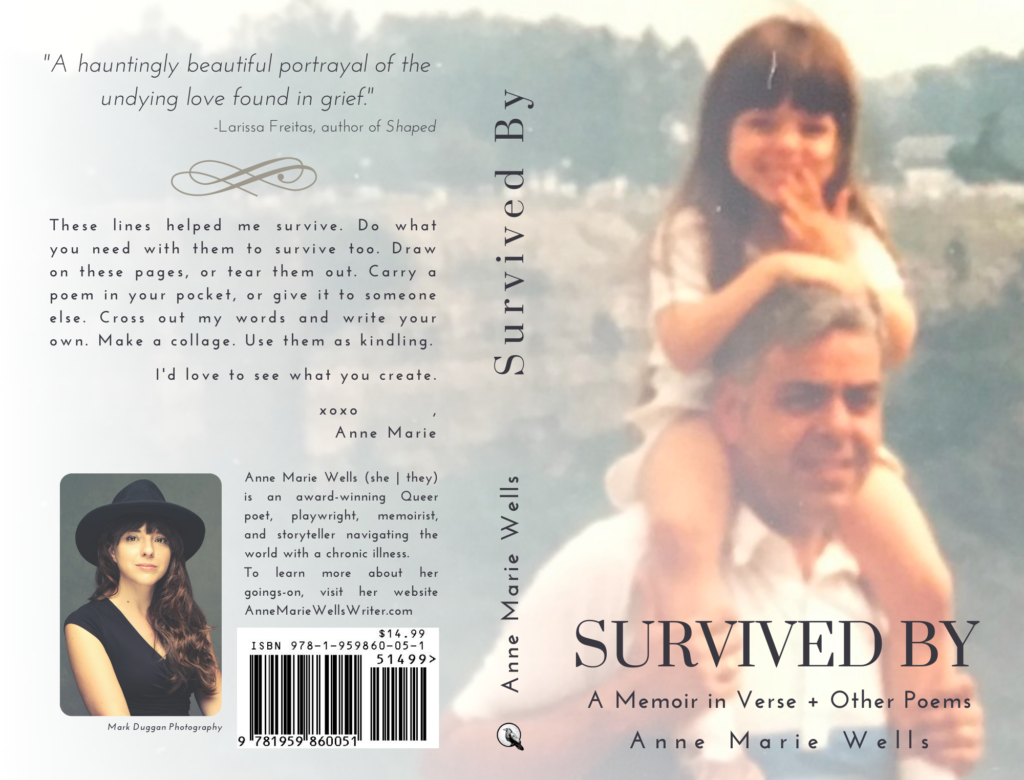by: Anne Marie Wells
A Place to Expel Despair

In today’s guest post, author Anne Marie shares how she turned tragedy into a beautiful tribute to her father. If you ever thought of turning your own true story into a legacy, you will find this post inspiring. You can learn more about Anne Marie on here and purchase a copy of Survived by here.
After my father was diagnosed with terminal lung cancer in September 2019, I needed a place to release the boiling lava that erupted from within. I turned to my Medium blog the way I turned to my Blogspot to report the travails of graduate school, the way I turned to my LiveJournal to divulge the many melodramas of high school, the way I turned to my composition notebook in middle school, sure that no one had hurt the way I hurt after Fran Sheehan, my first kiss, broke up with me.
In the abyss of my father having “one year to live,” I needed a place to not only expel my despair, but I needed a place where others could go if they wanted to know “how I was.” There were just too many loose acquaintances asking probing questions: “Is your father in pain?” “Was he a smoker?” “How long does he have?” I had very little emotional capacity, so I reserved what little I had left for my father, mother, sister, and my relationship at the time. I couldn’t spare any energy for anyone else. Well-meaning texts went unanswered. If they wanted to know how I was, how I was transforming from a human being into a maggot-laden sack of offal, they could read my blog.
I Will Remember You This Way, I Promise
It wasn’t until December 2019 when my father was rushed to the hospital with pneumonia and sepsis on top of his cancer that I wrote my first poem. He lay in the hospital bed, unconscious, antibiotics coursing through his IV, and I borrowed a pen from the nurse’s station to write a poem on the back of a receipt I had in my bag.
Seeing my father, too weak to even hold an ice chip in his mouth, using the strength he had to ask his doctor if his hospital stay would be covered by his insurance, I thought about how my father would want me to remember him; what moments; what words of wisdom would he want me to have emblazoned into my memory instead of him in an avocado green medical gown telling my mother to sign his “Do Not Resuscitate” order as his proxy.
I was transported to Humiston Beach where my father and I would go for walks when I would visit my parents in eastern Florida. One time in August 2016, after I had just gotten back to the States from a month abroad, my dad and I, while walking at sunset, happened upon a nest of newly hatched turtles crawling from their sandy burrow and flopping their way to the ocean. We stood over them and watched until the sky turned black. I used my iPhone as a flashlight to guide us the rest of the way to our car.
Four years later, I wrote the poem “I Will Remember You This Way, I Promise” at 2 AM in the cancer ward of Cleveland Clinic in Vero Beach. Without knowing it at the time, it would be the first poem that would ever be published under my name, finding a home with In Parentheses a month later, and it would be the first poem in my full-length poetry collection, Survived By.
A Ghost Told Me to Write Poems
I don’t know why I turned to poetry. When people ask, I tell them a ghost told me to write poems. I had never written poetry before that night or even had an inkling to write poetry. Then it became a fixation.
My father passed away less than two months later, and I resigned from what I thought was my dream job as the executive director of a science education nonprofit and took a 60% pay cut at an entry-level, caregiving job so that I could go back to school part-time and earn my degree in English.
At the same time, I was accepted into The Community Literature Initiative (CLI) poetry publishing program and began curating my collection that is now Survived By. In my original concept, my collection had six sections: three that reflected my father’s diagnosis, illness, and death, and three that reflected my relationship at the time, our breakup, and finding new love.
Failure as Blessing
I pitched my book to indie publishers for a year after completing the CLI program and received rejection after rejection. Seriously–I collected over 120 “no thank yous”. The failure was a blessing though. I had to reconsider what I wanted my collection to be. I wanted it to be an homage to my father and a life raft for others drowning in grief. There was no room for this secondary storyline of lost and new love.
(Plus, my new boyfriend and I broke up pretty epicly. I had uprooted my life to be with him in Los Angeles, and we broke up less than two months after I moved in. He gave me a weekend to move out when I was unemployed and had nowhere else to go. Oh, and I had two emergency room visits while unemployed with no health insurance. I was extremely ill, had lost about thirty pounds, and now had thousands of dollars in medical bills. I couldn’t be promoting a book with lovey-dovey poems about this person who ruined my life!)
I had read many books in verse by this time including Jacqueline Woodson’s Brown Girl Dreaming, Elizabeth Acevedo’s Clap When You Land, Thanhhà L?i’s Inside Out and Back Again, and Kwame Alexander’s The Crossover. I returned to my blog posts, copied them into a word document, and started adding line breaks.
A Blog’s Reincarnation Into a Poem
Looking at my words from two years prior, I felt like I was reading the book that I needed at that time but didn’t have. It felt like someone else had written it just for me. At the same time as I was cutting out unnecessary qualifiers and replacing my captain’s log-like “telling” with imaginative language and metaphors, transforming my blog posts into a memoir-in-verse, I was also hurting for this past version of myself. I cried (a lot!) at all of the moments that hurt me then that still hurt in the same ways, and I cried anticipating the greater hurt that my past self was about to experience but didn’t know was coming. But crying felt good, like a lanced boil. I had spent two years grieving the loss of my father, but I also needed to grieve this past version of myself who had two parents and never would again. Re-reading these entries through the lens of someone who had begun healing, who had been through so much therapy (like, so much!), and who was now a poet, I was able to relive these traumatic events also through the new lens of beauty and meaning.
My blog posts weren’t chia seeds, though. They didn’t change overnight. Because I was so close to the subject, I wasn’t always able to step back far enough to see all the ways the poems could be strengthened. I employed my network of poet friends to read through my work and give me the insights and feedback only outside eyes could see, to help each piece evolve into the poem they were meant to be. I looked forward to their revisions knowing that these changes would help me better honor my father’s memory.
When I sent this version of Survived By out to publishers, it was picked up three months later.
TL;DR
If I had to say the two things that I learned from the process of transposing my blog posts into poems, it would be:
- Trust rejection. The nos led me to creating something I’m even more proud of.
- The world needs to hear everyone’s story. When others shared their experiences–including the miserable, ugly parts–it helped me to feel less alone in my misery. When I shared my experiences–including the miserable, ugly parts–I heard from so many people about how it has helped them. And knowing that I’ve helped others also helps me. I feel like something good has come from the worst experience of my life, and that is healing to me.
Do you have a blog that is a candidate for a memoir-in-verse? Why not try it out as an experiment? Explore the possibilities of line breaks, descriptive language, and extended metaphor in your prose. It might lead to your next big breakthrough. And even if it doesn’t, maybe it will spark a different idea. Creativity begets creativity.
